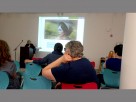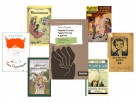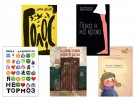Children's Literature Discussion
Event Venue:
Tompkins Square Library331 East 10th Street
New York, NY, 10009 | (212) 228-4747
Event Date:
Tuesday, May 15, 2018 | 5:30-7:30 pmOlga Bukhina, translator, writer, literary critic, children’s literature specialist will discuss two important topics in contemporary Russian-language children's literature:
1. Why are they so afraid of children’s books: New faces of contemporary Russian children’s literature and the Russian state
While patents, teachers, and researchers still debate the burning issue of the death of good Russian children’s literature, it has gradually but steadily staged its comeback. Among multiple publications of quality contemporary and classic European and American literature, not to mention the Russian and Soviet classics, we seea growing number of modern Russian poetry collections for small and not that small children, new books for teenagers, andnon-fiction books for young readers. Several innovative publishers together with a variety of literary prizes were and are constantly discovering new names of these who write in Russian. These new books are often talking about serious and controversial issues of Russian history, contemporary events, and problems and feelings of contemporary children and teens. They strive to talk to modern teenagers, using their language and their spheres of interest. A lot of conservatively oriented parents and teachers are not very happy with this new development; they still prefer to read and reread the familiar Soviet and Russian Imperial classics. Some of them are constantly trying to see the traces of “sedition” in these new books for children. The Russian State also wants to regain the control of children’s literature; a special law “protecting” children from any upsetting information in children’s books was issued by the Russian Duma in 2014. Nevertheless, the process once started is not that easy to stop, and every year brings more of new promising names and new interesting books.
2. The Ugly Duckling, Harry Potter, and others: American, European, and Russian children’s books about orphans
The Ugly Duckling, Cinderella, Oliver Twist, Jane Eyre, Tom Sawyer, Anne of Green Gables, Pollyanna, Pippi Longstocking, Mottel, Knyazhna Dzhavakha, Assol’, Harry Potter. What do they all have in common? Why are these stories so universal? Why are all of us so easily identifying ourselves with these characters? Indeed, “Harry Potter” is one of those books which provides us with a nearly universal identification. Everyone has something in common with“The Boy Who Lived.” Myths, fairy tales, and children’s books about orphans are a perfect projection of something that is deeply hidden in each of us. On that deep psychological level, an orphan is somebody who is extremely unprotected and absolutely vulnerable. Parents are natural protectors for the child. “No parents” means no shell within which to hide. At the same time, “no parents” means much more freedom and dangerous adventures. Being an orphan also means being special, a lost or stolen child of a King, Tsar, or a rich parent. Who did not dream about different, “better” parents? Besides, an orphan in the book may turn out to be a savior of world. Olga Bukhina, the author of the book The Ugly Duckling, Harry Potter, and Others: A Guide to Children’s Books About Orphans will introduce us to the famous orphans in American, European, and Russian children’s literature.
Watch Olga Bukhina's children's literature discussion via YouTube




